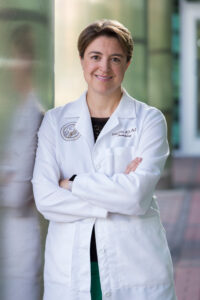The ACR’s Committee on Research (COR) helps advance and maintain high-caliber rheumatology care through its focus on research affecting patients with rheumatic diseases and its engagement with the ACR’s Committee on Government Affairs (GAC) on legislative advocacy. Kristine Kuhn, MD, PhD, associate professor, Division of Rheumatology, University of Colorado Anschutz Medical Campus, Aurora, is the new chair of the COR and provides a glimpse into what she hopes to bring to her time as committee chair.

Kristine Kuhn
The Rheumatologist (TR): Why were you interested in becoming chair of the COR?
Dr. Kuhn: Rheumatology research faces several challenges, including insufficient funding despite the number of individuals affected by rheumatic diseases, workforce shortages that affect research as well as clinical practice, and many gaps that need to be bridged between basic science, clinical research, therapeutic trials and patient outcomes. During my previous work with the COR, first as a microvolunteer [now known as a special projects volunteer] and then as a member, I saw how the COR can address the challenges faced by researchers. For example, the committee:
- Works with the Rheumatology Research Foundation to develop grants and programs to recruit and retain investigators;
- Advocates to Congress and meets with the National Institutes of Health (NIH) and U.S. Department of Defense (DOD) to expand research funding;
- Hosts programs for career development; and
- Aids discussions among researchers that address gaps in the field.
Because I believe in the mission of the COR, I was interested in chairing the committee and building upon its successes.
TR: What are your plans and goals for the committee over the next couple of years?
Dr. Kuhn: My goals are to address the current challenges to rheumatology research. We will continue our ongoing efforts to expand research funding by meeting with the NIH and collaborating with the GAC and the Foundation. I would like to review the success of our basic and clinical research pre-conferences at the annual meeting and identify ways that we can improve these conferences through more translational and integrative offerings, as well as enhance trainees experiences’ at them. These will be my top priorities initially. However, as we have learned in the past year, flexibility to pivot and address emerging issues is also necessary!
TR: Have you been involved in any previous activities with the ACR?
Dr. Kuhn: I served on both the annual meeting planning committee and on the GAC as the COR liaison. In all honesty, I was hesitant to be part of GAC [because] I didn’t see myself as political and thought the position would focus on the needs of clinicians and not researchers. However, my experience was quite the opposite. The GAC members were very welcoming and enthusiastic about their mission, which focused on both clinical practice needs as well as pushing for additional NIH research funding. An ongoing project that is special to me is our work with Congress and the DOD to obtain special funding for arthritis research. Thus, I learned how the GAC formed a very important arm of the ACR that represents the needs of all members.
TR: On a more personal note, why did you decide to pursue rheumatology as a career? Anything you’d like to add to give members a sense of who you are and what you bring to this position?
Dr. Kuhn: I was first exposed to rheumatology as an undergraduate student working in a molecular biology lab investigating antibody cross-reactivity between an E. coli protein and dsDNA relative to lupus and was fascinated by the immunology related to lupus. I later spent a summer exposed to additional rheumatology research and patient care with Rafi Hirsch, MD, and Bob Colbert, MD, PhD, who were at Cincinnati at the time, which convinced me to pursue a combined medical and graduate education. I matriculated at the University of Colorado Medical Scientist Training Program where I met clinicians like Sterling West, MD, Bob Janson, MD, and Dennis Boyle, MD, who were the first to get me excited about clinical rheumatology as I began to appreciate the intricate links between the clinical practice of rheumatology and immunology research.
I decided to work with Mike Holers, MD, to continue investigating the immunology of rheumatologic disease for my PhD thesis. By the time I finished my PhD, I knew I wanted to remain in rheumatology and, as my husband jokes, I didn’t apply for internal medicine residency after that—I went straight for rheumatology fellowship. Washington University in St. Louis, Mo., provided me an outstanding opportunity to combine residency with fellowship in their Physician Scientist Training Pathway, where I trained with John Atkinson, MD. While I ultimately completed my postdoctoral research in a gastrointestinal pathology lab, it was Dr. Atkinson and then Dr. Holers who helped me craft my current research program linking the immunology of gut mucosa to joint pathology. All of these individuals together have been instrumental in both encouraging and challenging me along my career development.
I often refer to myself as a Kansas farm girl who is ready to get the work done.
Mary Beth Nierengarten is a freelance medical journalist based in Minneapolis.

